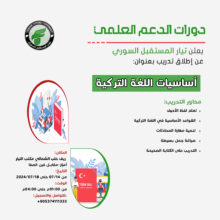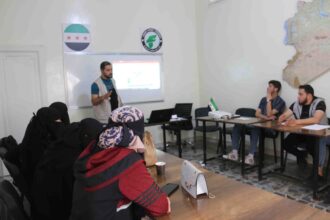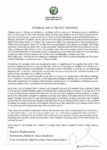Damascus University: A Great History and a Painful Reality

Damascus University ranked (67th) out of (115) Arab universities in a classification conducted by the “Association of Arab Universities.” Meanwhile, the “Webometrics” site ranked Damascus University (3108th) globally for the year 2023.
This decline and retreat in the status and value of Damascus University was not a product of the war moment but was clear and noticeable since the Assad regime, first the father and then the son, seized power in Syria.
Damascus University:
Damascus University is the oldest and largest university in Syria, established in the early twentieth century, and is considered the mother university with its origins tracing back to the early twentieth century.
The history of Damascus University can be summarized in the following stages:
- In 1901, the establishment of an office for a medical school in Damascus was approved.
- In 1903, the “Medical School” in Damascus was opened, which is considered the first nucleus of the university.
- In 1919, a medical institute and a law school were opened in Damascus.
- In 1923, the Syrian University in Damascus was established by a decree from Subhi Barakat al-Khalidi, the President of the State of Syria.
- In 1958, the name “Syrian University” was changed to “Damascus University”.
Damascus University distinguished itself from other Arab universities by Arabizing its curricula, including medical ones, and welcomed students from all Arab countries, especially from the Maghreb, the Arabian Gulf, Yemen, Jordan, and others. Until 1970, before Assad’s seizure of power in Syria, Damascus University ranked second in the Arab world, after Cairo University, only to begin a gradual decline despite the presence of an educational and cultural elite and a nominal administrative independence of the university during the Assad regime. In 2004, Damascus University’s ranking in the Webometrics classification was 48 among 100 Arab universities.
By 2010, all Syrian universities had fallen out of the top 100 Arab universities list.
In context, Damascus University’s ranking in the QS (qs) was 1201+ in the new 2022 ranking, a decline from its 2021 position of 1001+, a drop of 200 points in one year!
In the German Edurank classification for world universities, Damascus University ranked 3571 out of more than 14,000 universities included in this classification in the previous year 2022.
According to the Times Higher Education website, Damascus University is outside the global ranking.
The reasons for this decline and retreat are attributed to the Ba’athist ideological dominance over the educational curricula, particularly the introduction of Ba’athist national subjects in the first and second years, and the prohibition of political activities of other political parties at the university. Consequently, Damascus University was transformed into a tool for transmitting and generalizing the autocratic political system’s ideas to students only!
Another fundamental reason lies in the depletion of the university’s scientific role since the 1980s, where the Syrian regime created a special selection process for university admission through military affiliations: Sa’iqa, Shabeeba, and other party affiliations: active member, supporter, and others.
Reasons for the Continued Decline in Ranking After the Syrian Revolution:
This rapid decline after 2011 can be attributed to several reasons, including:
- Lack of focus on scientific research, and selecting candidates for PhD programs based on allegiance and loyalty to the Syrian regime rather than academic excellence.
- Subjecting the university to full security surveillance, prioritizing student recruitment over education, transforming the university into covert military centers, and imposing strict surveillance on professors and employees in the Ministry of Higher Education.
- Reduction in the budget allocated for higher education and scientific research from 10% of the general budget in 2010 to less than 2% in 2017, adversely affecting the quality of education.
- The emigration of hundreds of Syrian academics due to security persecution, and linking appointments and promotions to loyalty to the Syrian regime, creating an environment hostile to talent and skills.
- Elimination of many practical teaching methods in scientific faculties, reduction in allocations for scientific research in universities, leading to a decline in the number of scientific researches and publications in academic periodicals, and the absence of such researches on university websites.
- Difficulty in accessing websites due to lack of digital technology adaptation, failure to regularly update academic data and information of the university, decrease in cultural exchange and international cooperation with global universities, and the decline in organizing scientific events, activities, seminars, and conferences, as well as the decrease in scientific missions to Western universities and redirecting them to lesser-known universities in Russia and Iran.
- Decrease in the number of professors participating in international scientific conferences and winning global awards, and lack of focus on scientific research in foreign languages.
- The spread of the phenomenon of forging higher education degrees in collaboration with influential figures in the Ministry of Higher Education, reflecting negatively on the reputation of the degrees issued by these universities, in addition to the outdated educational curricula and teaching methods, and failure to keep up with technological advancements.
- Finally, the transformation of the offices of the Arab Socialist Ba’ath Party in Syrian universities into security offices for receiving daily security reports against professors and students sympathetic to the Syrian revolution and their families, leading to the detention of many professors and students in terrorism courts, and the conversion of faculty warehouses into prisons managed by security agencies.
Conclusion and Recommendation:
Undoubtedly, the damage to Damascus University is a clear indicator of the harm done to the educational sector in the areas controlled by the Syrian regime as a whole! Despite the challenges, examples like “Free Aleppo University” in the liberated areas are making progress, with Webometrics ranking it (41st) among local public and private universities.
Improving the level of Syrian universities in general, and Damascus University in particular, considering it as a Syrian landmark representing their contemporary history, makes preserving and caring for it a national necessity of utmost importance to free Syrians.
Therefore, we, the Syrian Future Movement, recommend:
- The necessity of separating education from politics and removing the influence of security agencies.
- Managing the universities and research centers academically and scientifically, increasing funding for scientific research, preserving Syrian talents and minds, and ensuring a suitable environment for their return.
- Developing laws for university organization, granting financial and administrative independence, valuing professors, and adopting clear criteria for their promotion based on objectivity and competence.
- The necessity of changing the current political system in Syria to achieve all of the above.
If the Syrian regime remains resistant to any political solution, we, the Syrian Future Movement, recommend:
- Officially entrusting Damascus University to the League of Arab States or the United Nations, recognizing the historical significance of Damascus University and its role as a major national link for Syrians despite their political differences.
Jacqueline K. Al-Shami.
Scientific Office
Department of Research and Studies






